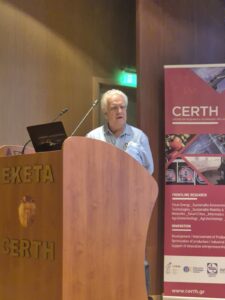CircSyst Workshop in Thessaloniki for Shaping the Future of the Circular Economy Together
Article written by Sotiris Pemas, CERTH
Participants explored how the DEM can improve the quality of recycled plastics, with universities and local industries driving innovation through stronger collaboration. EU-funded projects, such as Demo 8, offer key opportunities to scale up recycling, while discussions highlighted bold visions, the importance of education, and the need for citizen awareness. Despite challenges, the workshop emphasized that regional actions and partnerships are essential to turn ideas into real change.

CERTH hosted one of the regional workshops of the CircSyst project, bringing together 30 participants to discuss the future of the circular economy, its challenges, and opportunities. The half-day event in June was organized following the Quadruple Helix approach, engaging diverse stakeholders: representatives of industry (recycling and waste management enterprises), academia (Department of Civil Engineering and Department of Chemistry of Aristotle University of Thessaloniki), and civil society (research assistants, PhD candidates, university students, and employees from the retail and recycling sectors).


Optimistic and Pessimistic Scenarios
According to the optimistic visions, future recycling processes will become fully optimized, enabling both citizens and industries to integrate recycled products into their daily lives. Education and awareness-raising were highlighted as key drivers.
On the pessimistic side, participants expressed concerns about a potential end of EU funding for circular economy actions and a lack of change in citizens’ mindset regarding recycling participation.
Desired Changes
Several priority needs were identified during group discussions:
improving recycling infrastructure,
establishing additional collection points,
enhancing environmental education,
raising awareness among citizens and industries.
At the same time, participants emphasized the importance of preserving:
legal regulations that align with future goals,
the quality and durability of recycled materials,
and an unspoiled natural environment.
Backcasting: Steps Towards the Shared Vision
The workshop explored key barriers and necessary steps:
Laws and regulations: updating carbon emission regulations for companies, introducing stricter measures, creating more citizen incentives, and simplifying recycling processes.
Attitudes and mindsets: many people are unaware that packaging must be cleaned before recycling; awareness should be improved from an early age, starting at school.
Knowledge and skills: better recycling know-how, promotion of circular business models, and more education on product sorting.
Proposed actions included raising public awareness, improving education, motivating citizens to recycle, enhancing the recycling mindset, and funding new infrastructure.
The Value of the DEM for the Region
Participants recognized the potential of the DEM (Demonstration Environment Model) in ensuring the quality and purity of recycled plastics, which is essential for effective reuse. Universities were seen as key drivers of these actions, alongside stronger collaboration between local industries and organizations. Opportunities lie in EU-funded projects, such as Demo 8, which strengthen regional recycling value chains and foster innovation.
However, barriers such as bureaucracy, complex recycling processes, low awareness, and limited resources remain significant challenges.

Observations and Recommendations
It was noted that a lack of awareness about recycling processes—especially among older citizens—remains a pressing issue. Another challenge was that many attendees were unfamiliar with similar circular economy initiatives.
Immediate actions and recommendations include:
improving citizen awareness through more informative and innovative methods,
developing more regional-level initiatives,
and ensuring that citizens stay informed about the benefits and impacts of recycling.


